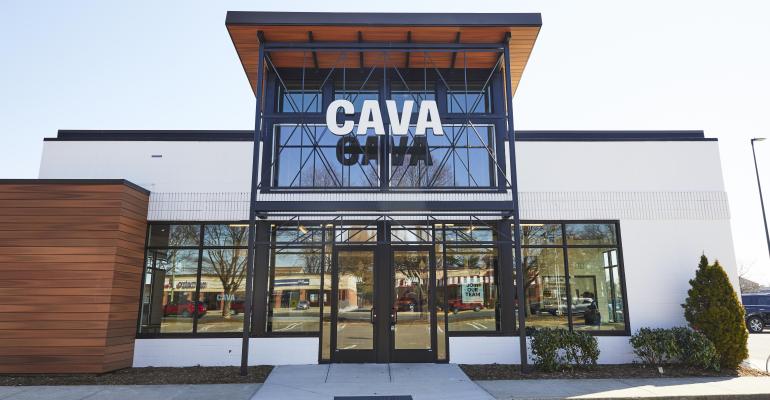CAVA is continuing to ride high after its IPO debut in June. The fast-casual restaurant company released its Q4 and fiscal year earnings on Monday and the results bucked the industry trends that have so far emerged during earnings season.
For the quarter ended Dec. 31, CAVA saw revenue grow 52.5% to $175.5 million compared to $115.0 million in the prior year quarter. CAVA ended fiscal year 2023 with 59.8% revenue growth to $717.1 million.
Unlike many of its restaurant industry peers, CAVA saw double-digit same-store sales growth both for the quarter and the full year. For Q4, excluding the 53rd week of 2023, same-store sales were up 11.4% while full-year results were up 17.9%.
CAVA same-store sales growth for Q4 consists of 6.2% from guest traffic and 5.2% from menu pricing.
According to Placer.ai data, Washington D.C.-based CAVA saw visits increase 18.4% during January year-over-year, and 40.1% in December. This is all while the fast-casual category saw overall foot traffic decline year-over-year.
Those are numbers that CEO Brett Schulman knew the brand could do. While he told Nation’s Restaurant News that the brand was in an “IPO halo” that has skewed the numbers, he expects a long runway ahead for CAVA.
Part of that is because CAVA is, at this point, in a category of one. But Schulman was quick to say that even if the category was crowded, CAVA would have a leg up because of the company’s menu and operations.
“I think it’s a reflection of this new cultural cuisine category that we’re creating and defining… people can come in and eat a flavorful, bold meal while making no compromises or sacrifices,” Schulman said.
The brand opened 72 net new units in 2023 and is expected to open 40-50 more in 2024. That would bring the brand to a little over 350 units by the end of this year. CAVA is still planning on breaking into new Midwestern markets that Schulman spoke about earlier in 2023 as part of its “coastal smile” strategy.
Surprisingly enough, the spicy and bold flavors of the Mediterranean are becoming popular with guests in places like Fayetteville, Ark., and Fayetteville, N.C.
“We’re seeing this cuisine be incredibly well received,” Schulman said. “We’re seeing a great welcoming in the new communities that we’re opening [in].”
The IPO helped CAVA break into new markets because of the brand recognition, but Schulman thinks Mediterranean food was ready to have its time in the sun.
Consistently ranked not only as the best for health but also the most popular diet, Mediterranean food has been in the cultural zeitgeist for years. It hasn’t, however, been taken to the level that CAVA is taking it to.
“We are defining and creating what we think is the next large-scale cultural cuisine category,” said Schulman.
That’s also something that is resonating with Gen Z. That group of consumers has consistently said they want global flavors, bolder flavors, and spice — all things CAVA has had for years.
In fact, the team at CAVA has been slowly adding in spicier items to follow the country’s collective taste buds over the past six months.
As it travels to new markets outside of the coasts, CAVA is investing in what it knows its customers want. According to Schulman, that’s eating in the restaurant. He said 64% of customers at CAVA wish to eat inside the restaurant rather than take their dish to-go.
“I think the demise of the dining room is greatly exaggerated. People still want human connection,” Schulman said. “People want convenience, and they want digital enablement. That's why we’ve tried to build out this multi-channel experience, so people can opt into their channel of choice.”
That also means that CAVA is a hospitality-first establishment, according to Schulman, so investment in people is crucial.
One thing CAVA did with the funds it raised from its IPO is invest in its team members. Though CAVA has always been a leader in higher pay for restaurant industry workers, it wanted to elevate what it was offering employees.
Schulman said that CAVA doesn’t expect to take any price increases with the introduction of AB 1228 in California when it goes into effect on April 1. He said the investment in the brand’s team members over the past few years will have lessened the impact of that bill on CAVA.
“We don’t want to just pass along that expense to our guests,” Schulman said. “We want to work on behalf of them.”
And while the leadership staff is working on elevating hourly team members’ pay, it’s also working on mitigating pricing that’s happened over the past few years at every restaurant chain.
“The percentage of [consumers’] income that they’re spending on food is at a 30-year high,” he said. “So, we want to make sure that we're helping them out in that situation and we’re working on their behalf and trying to put the best value proposition forward for them.”





